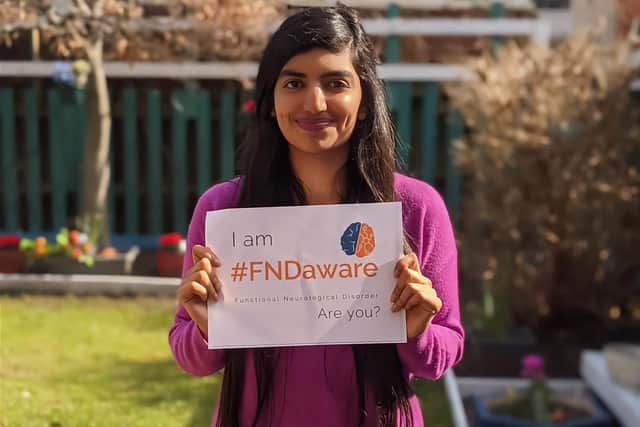How Shehla Ali is using her life changing illness to help others in a similar situation
Shehla Ali’s life was turned upside down in 2020 when the 31-year-old discovered she was suffering from FND.
Ms Ali, who is from Sheffield, was running her own social media consultancy but found herself struggling to complete the most basic tasks.
Advertisement
Hide AdAdvertisement
Hide AdShe has now launched a business called About M.E to help people with chronic pain management.


“It’s a one-stop shop to help with chronic pain management,” Ms Ali told The Yorkshire Post. “There’s products on there, there are resources, groups that you can join.”
Ms Ali hopes About M.E will make other people suffering from similar hidden illnesses feel less isolated.
It took two years for her to come to accept that she would not be able to live her life like she used to.
Advertisement
Hide AdAdvertisement
Hide Ad“I was very active, I used to hike mountains, I used to go to the gym quite a lot and then I couldn’t even do the basic things,” Ms Ali said. “I didn’t know who I was anymore.”
In fact, before setting up her own social media consultancy in 2016, she even went backpacking for a few months after quitting her job at a digital marketing agency.
FND is a rare condition which isn’t easy to identify because it doesn’t appear on tests like MRI scans, says Ms Ali.
She first started feeling unwell towards the end of 2019 but it was during the first lockdown that she really started to struggle.
Advertisement
Hide AdAdvertisement
Hide AdMs Ali would make regular trips to A&E after falling to the floor. However, her concerns were dismissed as just being in her head.
She said: “I started to become a bit slow with how I was functioning. It would take me a lot longer to put together a basic presentation together. It was difficult waking up in the mornings.
“I just thought I was being lazy and probably wasn’t working hard enough. I would read a message or email and forget about it. I’d get severe migraines.”
At first she attributed it to the lockdown but after talking to several neurologists she was diagnosed with FND in July 2020 and fibromyalgia in January 2021.
Advertisement
Hide AdAdvertisement
Hide AdFibromyalgia is similar to chronic fatigue syndrome. It causes widespread pain across the body and affects energy levels.
Ms Ali joined communities that had similar experiences and that helped her to feel less isolated.
She said: “With any other illness or condition that is recognised, you wouldn’t go around saying ‘go get some hobbies and be happy’. That just wouldn’t happen.
“That was something that fueled me because I wasn’t seeing enough of people advocating for FND.”
Advertisement
Hide AdAdvertisement
Hide AdThe representation of hidden illnesses needs to change if people are to take conditions such as FND and fibromyalgia seriously.
Ms Ali said: “There needs to be a lot more representation in the media for invisible illnesses.
“I’ve never heard of anyone with FND on TV apart from two American shows.
“There’s a lot of work to do and it’s something that I would like to be a part of in the future.”
Advertisement
Hide AdAdvertisement
Hide AdThe long-term prognosis for her is unknown. Instead, Ms Ali has been told to “go with the flow”.
“However, I would say I have made about a 70 per cent recovery,” she said. “Fatigue is my main symptom and memory loss.”
She doesn’t drop to the floor like she used to but has to pace herself.
Ms Ali has also launched a podcast called ‘A Spoonful of Recovery’ and through About M.E is hiring other people who suffer from similar conditions on a freelance basis.
For more information on About M.E, visit www.aboutme.group
‘Don’t be afraid to get help’
Advertisement
Hide AdAdvertisement
Hide AdShehla Ali’s message to anyone else suffering from similar symptoms is to speak out and not be afraid to get a second medical opinion.
She said: “Don’t be afraid to get help. Don’t be afraid to make life adjustments and say no to people.
“I was encouraged to exercise by my GP and then I had to listen to my body and realise that I would continue to be bed-bound if I carried on that way. Get other specialists involved. Research the illness and don’t be afraid to get a second opinion.”
Ms Ali added that talking to other people in a similar situation made a “huge difference” to her attitude.
---
Support The Yorkshire Post and become a subscriber today.
Advertisement
Hide AdAdvertisement
Hide AdYour subscription will help us to continue to bring quality news to the people of Yorkshire. In return, you'll see fewer ads on site, get free access to our app and receive exclusive members-only offers.
So, please - if you can - pay for our work. Just £5 per month is the starting point. If you think that which we are trying to achieve is worth more, you can pay us what you think we are worth. By doing so, you will be investing in something that is becoming increasingly rare. Independent journalism that cares less about right and left and more about right and wrong. Journalism you can trust.
Thank you
James Mitchinson
Comment Guidelines
National World encourages reader discussion on our stories. User feedback, insights and back-and-forth exchanges add a rich layer of context to reporting. Please review our Community Guidelines before commenting.